Stoker
 Stoker Directed by: Chan-wook Park Cast: Mia Wasikowska, Nicole Kidman, Matthew Goode, Jacki Weaver, Alden Ehrenreich Running Time: 1 hr 38 mins Rating: R Release Date: March 1, 2013 (Chicago)
Stoker Directed by: Chan-wook Park Cast: Mia Wasikowska, Nicole Kidman, Matthew Goode, Jacki Weaver, Alden Ehrenreich Running Time: 1 hr 38 mins Rating: R Release Date: March 1, 2013 (Chicago)
PLOT: A widow (Kidman) and her daughter (Wasikowska) are visited by a mysterious man (Goode) who claims to be the dead husband's long lost brother.
WHO'S IT FOR? Fans of horror that is more artful than it is gory. If you liked director Chan-wook Park's previous Oldboy for its violence, you'll probably find Stoker pretty underwhelming. However, if you're starved for horror movies with actual characters, and a more artistic interpretation of mystery, here is Stoker. Fans of Hitchcock should definitely take note of this one.
EXPECTATIONS: Park has shown his vitality by tackling different subgenres before, such as with his narratives on vengeance, or even vampires (Thirst). Having him bring his authorship to the states for an English feature seems like it would be his biggest challenge so far; how would a film by Chan-wook Park fit in with a moviegoer's appetite that also made the title The Last Exorcism Part II a real thing?
SCORECARD (0-10)
ACTORS:
Mia Wasikowska as India: Carrying the responsibility of providing this weird story its point of view, Wasikowska's India proves to be one of the film's less interesting components. It is the events that happen around her, and even Stoker's set, that drive this story most of all. However more intense Stoker may be than similar films it may be compared to, Wasikowska's version of a brooding adolescent is not nearly as special as her surroundings. Score: 5
Nicole Kidman as Evelyn Stoker: As a redhead living in a coffin of a house, Kidman provides compelling color to the oddities of Stoker. Seemingly naive to the events that are going on (and clueless to the strange facets of Charlie), this a a character who is more "normal" than her daughter or brother-in-law, but has her own striking intensity. Her moments in the third act seem like they're coming too far from left field, but are still essential to this story's message about family communication. Kidman shows once again that she can create a believable image of a pushover who also knows how to pushes back. Score: 6
Matthew Goode as Uncle Charlie: Considering his past roles in movies like Leap Year and Watchmen, one wouldn't expect Goode to be the type of man to actually fear. But Stoker puts Goode's face to great use, with his handsome eyes registering an uncomfortable intensity, and his general charming demeanor rendering as freakishly intimidating. Don't be fooled by his invitation for ice cream, Goode is creepy, creepy, creepy. Score: 7
TALKING: As the film works actively to cloud itself with mystery as much as possible, Stoker indulges in using winking dialogue that are important to the audience's impressions of characters as much as they are India's. This attitude makes the film feel all the more tedious, and raises the expectation from the audience that all these mysterious elements will have a grand payoff. Score: 5
SIGHTS: Stoker establishes its dominating taste of elegance most of all not with its classical score but with its visuals, in which formalist cinematography captures distinct Victorian sets that choose from a color palette of black or white. The camera can be wonderfully fluid in enhancing the visual experience of this mysterious film, slowly carrying us upstairs through a trail of blood, etc. Park's camera keeps Stoker alive even during its duller moments with its eye for poetry. Score: 7
SOUNDS: Clint Mansell (Black Swan) provides Stoker with a score very fitting to the movie's classically contemporary aesthetic. However, the finest piece to come from the Stoker soundtrack is not by Mansell, but by composer Philip Glass. Glass composes a key piece of music which is utilized during the film's finest scene, acting as a perverse type of intimate moment between Charlie and his niece. Score: 7
PLOT SPOILERS
BEST SCENE: That piano scene mentioned above. Whoaaa.
ENDING: It's not the most jarring of endings but ... hey, is that credit sequence going in the opposite direction?
QUESTIONS: Hmm. How will general horror fans who don't know Park take this film? How many teenagers are going to identify with Stoker and feel that it is their new favorite film?
REWATCHABILITY: Stoker is certainly tedious in the first viewing. However, it certainly feels possible that a second look to the film would make it go by if even just a little faster.
OVERALL
Stoker is an effectively weird movie that is enabled by the reputation of its director; Korean import Park pushes this story's oddities to levels that many American mainstream movies wouldn't dare touch without at least feeling the need to fully explain them. In this promising English debut from Park, we have taboos explored through the style of classic psychological horror, in a story that owes more than just a tip of the cap to Alfred Hitchcock's Shadow of a Doubt.
Despite the refreshing oddity that Park brings to American horror, Stoker's payoff to its many weird seeds is unsatisfying. The film is built around its polarizing artistic lunges that provide a pretty direct example of theme about the crucial bonds of family. As could happen with any genre, this movie is just a couple of conversations by the characters away from being nonexistent. ("What did you see in the basement dear?"). But, this family doesn't talk, or so Park says, and the artful weirdness of this film carries on. It works for the attitude of this film, which is proudly offbeat, but it still hints at a lesser screenplay.
FINAL SCORE: 6/10